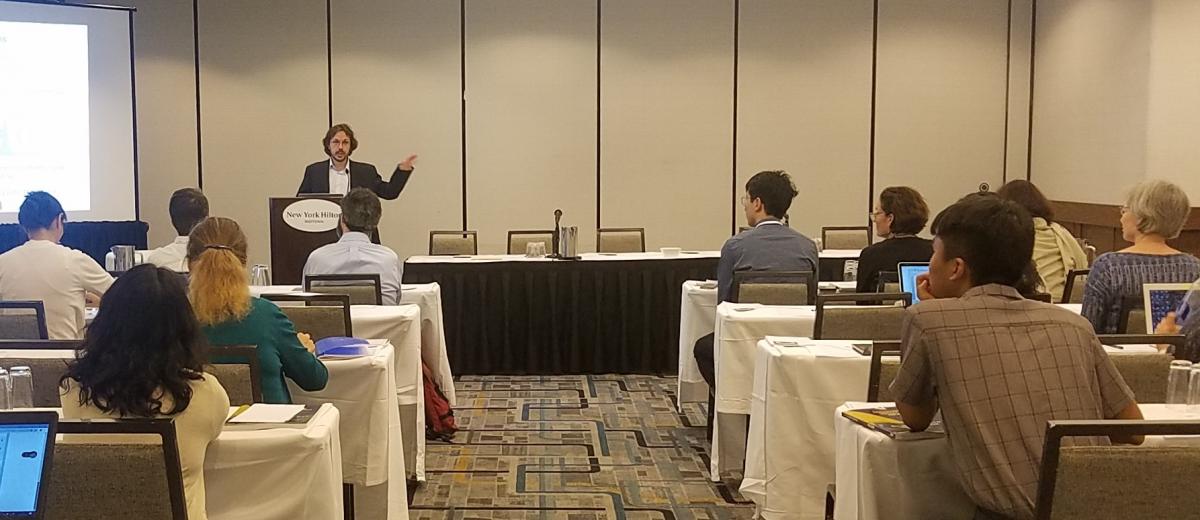Migration data and models for a better worldNew York, United States, 9 August 2019
Organizers: Yuan Hsiao (University of Washington), Lee Fiorio (University of Washington), and Emilio Zagheni (Max Planck Institute for Demographic Research).
The preconference workshop on Migration data and models for a better world: Incorporating perspectives from social scientists, data scientists and international organizations was organized by the Max Planck Institute for Demographic Research (MPIDR) in collaboration with the IUSSP Scientific Panel on Digital Demography and held at the Hilton Midtown Conference Center, New York (NY), United States, on August 9th, 2019, just before the 114th American Sociological Association Annual Meeting (ASA-2019).
The goal of this workshop was to facilitate a conversation about improving migration data by bringing sociologists familiar with the conceptual pitfalls of migration research together with two groups: (1) data scientists with strategies for inferring migration from new forms of digital data and (2) representatives from international organizations with specific needs for particular kinds of migration estimates. The workshop was limited to 70 slots and was sold out within a week of the announcement; the interest of social scientists in the field shows how inter-disciplinary efforts are the future of migration studies.
The workshop consisted of a short (10-minute) introductory speech by Emilio Zagheni (Co-Director of the Max Planck Institute for Demographic Research & Chair of the IUSSP Panel on Digital Demography) and two panel sessions each with 4 panelists. In both panels, each panelist made a 15-minute presentation, with a 30-minute discussion after all the presentations. The 63 participants in attendance represented a wide range of disciplines.

Migration plays a central role in population processes, becoming an increasingly important component of social, economic and political change across the globe. Given its often unjust causes and socially transformative consequences for origin and destination communities alike, migration continues to demand the scholarly attention of social scientists, especially those invested in overcoming social injustices. However, despite the growing importance of migration phenomena, migration data remain expensive and difficult to collect. Different institutions use different definitions to meet their various needs, and time after time difficulties in comparing data across context limit wider understanding.

Traditionally, migration research has mostly relied on standard survey methods. However, recently scholars from different fields have used innovative tools to understand migration, such as utilizing digital data or employing network sampling procedures. The first panel session brought together four experts who have conducted frontier research with innovative methods: Monica Alexander, Kiran Garimella, M. Giovanna Merli, and Yuan Hsiao. A common theme that ran through the panel was how innovative sources of data allow social scientists to inquire about migration processes that are difficult to capture by conventional methods. Furthermore, new sources of data are not a replacement for, but rather a complement to conventional migration research.

With increasingly diverse sources and perspectives to study migration, it becomes even more critical to understand how migration data can have implications for a better social world. The second panel session speakers, Sara Curran, René Flores, Patrick Gerland, and Lee Fiorio discussed these implications. The panel explored various aspects in-depth, concluding that in order to make appropriate policy applications there was a need for better conceptualization of migration processes and a need to consider the strengths and limits of migration data.
The presentations incited strong interests from the participants, with discussions ranging from how to effectively draw from Twitter data to how to measure public opinion on immigrants. The organizers wish the workshop had more time, as the conversations were very lively and exciting, and plan to repeat this discussion between the different disciplines and fields in the near future. See also:
|

